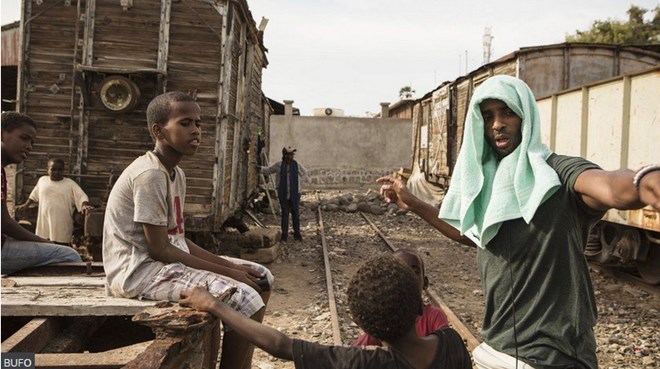
Monday November 1, 2021
The prize-winning film The Gravedigger's Wife looks like the work of a seasoned director, yet it is Khadar Ahmed's debut feature.
Its pacing, timing and beauty show a confidence belying the 40-year-old's lack of experience.
He fled Somalia's civil war with his family and ended up in Finland aged 16 - and has never made it to film school.
"God knows how many times I applied for film school but never got in," he told the BBC.
Yet promoting Somali-language film has become a goal - to show his culture and roots on screen.
For Ahmed, winning the top prize last month at Africa's prestigious Fespaco film festival proves that dramas in his mother tongue can cross borders.
Opposite of Bollywood
The Gravedigger's Wife is a tender love story with dark comic flashes about the lengths a person can go to in order to save someone they love. The gravedigger - Guled, played by Omar Abdi - sits outside hospital with his comrades, shovel in hand, waiting for a patient to die.
Ironically, it is only through these deaths that he can make money to help keep his sick wife, Nasra, alive. Played by Yasmin Warsame, she is dying of kidney failure. The enormous cost of life-saving treatment forces Guled to make some extreme decisions.
A large audience of Somalis, and people of Somali heritage, did get to see it at September's Toronto International Film Festival. "They all felt a sense of pride. It was a joy to watch them enjoy it and then come up to me afterwards," Ahmed says.
The director also hopes that his path to making the film could serve as an inspiration.
He never went to film school, nor received any formal directorial training and has never worked on anyone else's film set.
His journey began a decade ago when he wrote the first draft of the screenplay. He was so determined that he would direct it himself in Somali that he put it to one side to learn the craft in part by absorbing the ideas of the films he loved.
After watching Bollywood, he turned to cinema from all over the world, including South Korea and Iran. But his biggest influence has been films made on the African continent. He especially admires the work of Mauritanian Abderrahmane Sissako, who was the chairman of the Fespaco prize jury.
Chadian director Mahamat-Saleh Haroun has also had an impact on Ahmed, and he remembers crying at the beauty of his 2010 film A Screaming Man.
After studying these films and trying to understand the techniques, he directed two short films and wrote a screenplay in Finnish before he felt able to take on The Gravedigger's Wife.
Now he is left wondering if he had gone to film school whether the experience would have changed him for better or worse.
"I want to encourage young African film-makers, non-privileged film-makers, to really grab cameras and do their own stuff. Write their own stories, capture their own lives and do it on their own, because not everyone's so privileged."
He himself is determined to carry on making films in Africa: "I hail from the continent and I believe that the future of cinema is in Africa. There are so many stories that cannot be set in Western countries."
'The film is biggest prize'
He believes the precariousness of life and the dilemmas that people like his fictional gravedigger face are what can make great drama. But when it comes to genre, he is eager to explore the possibilities.
"I want to make comedy, I want to make sci-fi, I want to make Westerns, horror films and thrillers," he says.
The Fespaco award may help him do this, but for now after years of honing his vision "having the film made was the biggest prize".
"I'm just really happy that all this is happening for the film."